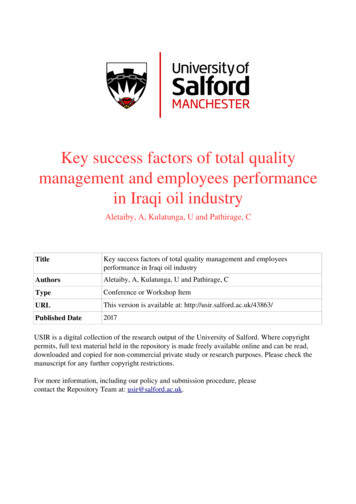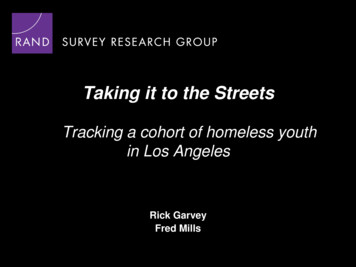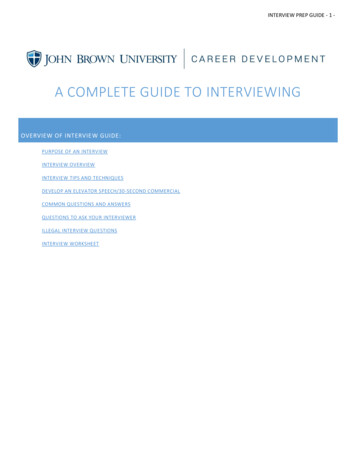
Transcription
INTERVIEW PREP GUIDE - 1 -A COMPLETE GUIDE TO INTERVIEWINGOVERVIEW OF INTERVIE W GUIDE:PURPOSE OF AN INTERVIEWINTERVIEW OVERVIEWINTERVIEW TIPS AND TECHNIQUESDEVELOP AN ELEVATOR SPEECH/30-SECOND COMMERCIALCOMMON QUESTIONS AND ANSWERSQUESTIONS TO ASK YOUR INTERVIEWERILLEGAL INTERVIEW QUESTIONSINTERVIEW WORKSHEET
INTERVIEW PREP GUIDE - 2 -PURPOSE OF AN INTERVIEWIt is important to remember that the purpose of the interview is two-fold:(1) THE EMPLOYER NEEDS TO FIND OUT IF YOU ARE THE BEST CANDIDATE FOR THE JOB: Can you do the job?Do you have the appropriate background, including education, skills, and experience?Do you have the expertise needed to make you "stand out?"Are you able to learn and adapt? Will you do the job?Do you want to work for this company, or do you simply see it as a stepping-stone?Are you aware of and honest about your future goals and plans?Are you motivated and eager to learn? Will you fit in?Do you work well with others?How do you respond to supervision and criticism?Do you have the skills to balance where their team is currently weak? Do they like you?(2) YOU NEED TO FIND OUT IF THIS IS A GOOD OPPORTUNITY FOR YOU: What do I want my typical workday to look like?What are my career goals for the next five years?What kind of work schedule do I want?What kind of work setting do I want?Am I willing to relocate?
INTERVIEW PREP GUIDE - 3 -INTERVIEW OVERVIEW:“You never get a second chance to make a first impression.” Interviews are bound to put a lot of pressure on you. Below is a list ofitems to review before your interview to help you make your best first impression.TYPES OF INTERVIEWSTELEPHONEA phone interview is usually used to screen candidates early in the process. You must impress them on the phone in order to getanother interview. Select a time and location when you won’t be interrupted.Think about background noise, be inside.Turn off all sounds on your phone.Arrange all documents you will need in front of you.Enunciate and keep your answers short.Dress professional, it helps you to be more professional.Smile and gesture as if you were speaking face-to-face.VIDEO INTERVIEWSAnother first round interview or interview from afar. These are increasing in popularity Test your technology and be sure to have a reliable Wi-Fi connection.Choose a good location, neutral background.Make eye contact.Get comfortable seeing yourself on camera.IN PERSON INTERVIEW, ONE-ON-ONEMost job interviews, see next section for information.IN PERSON INTERVIEW, ONE-ON-ONE, MULTIPLE INTERVIEWSYou will meet individually for multiple interviews. This is a good sign, it means you are worth their time. Review your schedule. Know about your different interviewers.Don’t be afraid of repetition. Each interview is a new conversation.Keep your energy up!See additional information in the next section.PANEL INTERVIEWThese are usually the most intimidating. You will not be able to please everyone.Maintain eye contact with the person who asked the question.Remember names and respond with them.See additional information in the next section.
INTERVIEW PREP GUIDE - 4 -BEFORE THE INTERVIEWKNOW YOURSELF. What do you have to offer – knowledge, skills, and abilities? What are you goals?See page 8 on creating your own elevator speech or 30 second commercialCreate a list of your strengths. From your research of the company and the industry, refine your list of strengths into threeto five attributes that a company might want in an employee. Be ready to offer evidence through scenarios and stories.Make the “Fit Test“: Be absolutely clear that the role and company you d like to apply for really fits with your skills, careertrack, professional and personal objectives, beliefs and experiences. Conversely, check if you might match with the cultureand needs of the company you d like to join.RESEARCH THE COMPANY AND POSITION Researching the company and the position shows you take an interest. Organizations want to hire people who arepassionate about their work and mission. Visit their company website, use Glassdoor, read recent articles about theorganization, and note any major changes the company had made recently. Be sure to know basic company information(annual sales, number of employees, geographic location and latest industry trends).THE KINDS OF THINGS YOU SHOULD KNOW ABOUT THE COMPANY INCLUDE:oooooooooHow long has the company existed?What services does the company provide or what products does it make?Who are their major competitors?What divisions or subsidiaries exist?What is the parent company?What geographic areas are covered?How many people are employed by the company?What are the company's assets and earnings?Does the company have any international operations?THE KINDS OF THINGS YOU SHOULD LEARN ABOUT THE INTERVIEW ITSELF INCLUDE:oooooIf possible, know and be able to pronounce the name of the interviewerFind out what you can about the format and length of the interview? Will you meet with a panel?Will you meet with several people individually?Will you have a lunch meeting?Be certain you have clear and precise directions to the interview site (a trial run ahead of time can save you thepotentially fatal embarrassment of arriving late)GET FAMILIAR WITH COMMON INTERVIEW QUESTIONSThere are select questions that an interviewer is almost always bound to ask. For example: What are your strengths andweaknesses? Find a thorough list of frequently asked interview questions on page 9.PREPARE ANSWERS TO INTERVIEW QUESTIONS.There are several different ways to answer an interview question, but for the most impact we suggest following a STAR format. Lookfor STAR samples and guidelines on page 6.KNOW YOUR INTERVIEWER(S):Today it s easier than ever to collect information about your interviewers. Spend 40-50 minutes on Google, LinkedIn, etc. and youshould be clear about titles, roles, careers, etc. of all the people who ll interview you.
INTERVIEW PREP GUIDE - 5 -PREPARE THREE TO FIVE QUESTIONS FOR THE INTERVIEWERYou will be asked the majority of the questions, but to show that you are engaged in the company it is in your best interest to askquestions about the interviewer and the organization. How? See page 12.DRESS FOR SUCCESS An interview (especially a first interview) is your time to make your best impression. To stand out from your competition,dress appropriately for the interview. How do you know what dress is important? Before the interview, ask yourinterviewer or the receptionist about the organization’s dress code. If you feel uncomfortable doing this, it’s always betterto be slightly overdressed.Appropriate attire supports your image as a person who takes the interview process seriously. Even if you are aware thatemployees of an organization dress casually on the job, dress up for the interview unless you are specifically told otherwiseby the employer. Your clothing should be conservative and well-fitting; it should not take center stage. If you are primarilyremembered by your interview attire, this is probably because you made an error in judgment!o Standard Interview Attire for Men: A white or muted color shirt is best. A dark or gray suit, solid or with subtlepinstripes. There is more flexibility with ties, but conservative colors and patterns are most appropriate. Polished,leather lace-up shoes with dark or matching socks. If you have facial hair, make sure it is minimal neatly groomed.Avoid wearing cologne or aftershave on the day of your interview. Be conservative with watches and otherjewelry. Note that earrings might not be viewed positively.o Standard Interview Attire for Women: A neutral business suit. A white or light colored blouse under the suit jacket.If wearing a skirt, it should be knee-length. Avoid high slits. Jewelry should be simple, with no dangly flashyearrings. Consider not wearing perfume. Do not show cleavage. Neutral hosiery with basic pumps, low heel. Avoidopen toe shoes or sandals. Light make-up is recommended. Clear or light nail polish. If you carry a purse, keep itsmall and simple.All clothes should be neatly ironed. Suits usually have tacking stitches to hold vents in place before purchase; make surethese are removed. You should also carefully inspect for dangling threads, lint, and missing buttons. Avoid carrying abackpack or large purse to the interview. Bring a portfolio with copies of your resume, transcript, a notepad, pen, and a listof questions for the employer.BRING PERTINENT ITEMS It’s important to demonstrate you’re organized and prepared with information that will support the fact that you are theright person for the job. Bring extra copies of your resume, any work samples, reference letters or performance reviews.Place them neatly into a folder to make sure that everything is in one place.ARRIVE 15 MINUTES EARLY. It goes without saying that being early is much better than being late. Arrive early in case there is additional paperwork foryou to fill out. You can also use that time to mentally prepare for the interview. How? Be sure to print out directions andcheck the local traffic before leaving for the facilityDURING THE INTERVIEWMAKE APPROPRIATE GESTURES AND EYE CONTACT WITH THE INTERVIEWERYour posture, body language and eye contact can say a lot about your confidence and interest in the position. How: If youhave difficulties making eye contact, especially in uncomfortable situations, practice your interview questions in a mirrorand purposefully make eye contact with yourself.TAILOR YOUR ANSWERS TO YOUR AUDIENCE
INTERVIEW PREP GUIDE - 6 -Using “technical” terms specific to your position can be difficult for a Human Resources representative to understand.Showcase your work knowledge and experience when speaking is with the hiring manager, but don’t get too technical withHuman Resources.KEEP YOUR RESPONSES RELATIVETalking about a situation that doesn’t relate to work or the position you’re applying for can be distracting for both yourselfand the Interviewer. Be sure to talk thoughtfully and practice your responses. If needed, take a couple of seconds to gatheryour thoughts after each question. An Interviewer will appreciate your clear response.AVOID SPEAKING NEGATIVELY ABOUT PREVIOUS EMPLOYERSCriticizing a past employer can give the wrong impression to the Interviewer that you are negative and possibly a difficultemployee. When speaking about a situation at your previous employer, spin negative situations into positives by focusingon your actions that made a positive difference.CLOSING AN INTERVIEW You’re rounding the final corner of your interview, but how do you end it professionally? Here are a few points to helpyou.Prepare a brief summary of your competencies and strengths, related to the positionAsk about “Next Steps”, which will reiterate your interest in the position and the companyThank the Interviewer for his/her time and consideration. Be sure to smile and make appropriate closing gesturesAsk for the interviewer’s business card so you can send a thank you letter.AFTER THE INTERVIEW Once you’ve ended the interview, be sure to send a thank you letter within 24 hours of the interview. Use your bestjudgment to decide whether the Interviewer would prefer to receive a note via email or mail. Be sure to send one to allof those whom interviewed you. Remember that hiring decisions can take some time, so don’t feel discouraged ifimmediate next steps aren’t disclosed during the interview. The Interviewer may need to see other Candidates anddiscuss with colleagues before making any commitments.Secondly, and this is very relevant in case you had not gotten the job, you should contact the company to ask for apersonal and detailed feedback of your interview and about your performance. This is very helpful in order to improvefor the next interview. In addition, you should reflect on the previous interview(s) and go through it step by step.Review what went well and not so well. Focus on the improvement areas and write down specific action steps on howto better prepare and execute in the future.
INTERVIEW PREP GUIDE - 7 -INTERVIEW TIPS AND TECNIQUES:In this section, we will discuss common interview questions, techniques for answering them, and what employers are looking for.STAR METHODTo provide the interviewer with the information needed, apply the STAR technique as outlined below:SITUATION- Describe the situation that you were in. You must describe a specific event or situation, not a generalizeddescription of what you have done in the past. This situation can be from a previous job, from a volunteer experience, orany relevant event.TASK- Describe the task that you needed to accomplish. Be sure to give enough detail for the interviewer to understand.ACTION YOU TOOK- Describe the action you took and be sure to keep the focus on you. Even if you are discussing a groupproject or effort, describe what you did – not the efforts of the team. Don’t tell what you might do, tell what you did.RESULT YOU ACHIEVED- What happened? How did the event end? What did you accomplish? What did you learn?Wherever you can, quantify your results.MOST COMMON INTERVIE W QUESTIONSThere are two types of interview questions: Traditional and Behavioral.Traditional questions focus on the position, motivations or work history.Behavioral questions are focused on how you reacted to a situation and are intended to predict future work behavior. Theinterviewer asks questions that are aimed at getting the applicant to provide specific examples of how he or she hasdeveloped the required skill set for the job. Interviewers rely on this method to evaluate the candidate’s experiences andbehaviors and use them as indicators of the applicant’s potential for success.*Review a list of both traditional and behavioral based interview questions and answers.
INTERVIEW PREP GUIDE - 8 -WHAT EMPLOYERS ARE L OOKING FOR:WORK SPECIFIC SKILLS: Examples of these are computer programming, CAD, etcFUNCTIONAL OR TRANSFERABLE SKILLS: Skills that are transferable from one job to another, such as good communication or math skills.ADAPTIVE OR SELF-MANAGEMENT SKILLS: Are you dependable, a team player, a self-directed worker, a problem solver, a decision maker?25 COMMON REASON FOR EMPLOYER REJECTION1. Poor personal appearance14. Lack of maturity2. Lack of interest and enthusiasm15. Lack of vitality3. Overemphasis on money16. Merely shopping around4. Weak handshake17. Wants job only for a short time5. Late to interview18. Cynical6. Indefinite responses to questions19. Low moral standards7. Inability to express oneself clearly (poor voice, diction,grammar)20. Intolerant; strong prejudices8. Lack of planning for career -- no goals or purpose9. Lack of confidence and poise; failure to lookinterviewer in the eye10. Unwilling to start at bottom -- expects too much toosoon11. Makes excuses; evasive -- hedges on unfavorablefactors on record12. Lack of tact13. Lack of manners, courtesy21. Failure to ask questions22. Timid; lacks sufficient degree of assertiveness23. Overbearing; overaggressive; conceited24. Not prepared for interview; no research on company25. Lack of knowledge of field of specialization; not wellqualified
INTERVIEW PREP GUIDE - 9 -DEVELOP A PITCH/30-SECOND COMMERCIALAs a job seeker, you will need to define who you are, what you are looking for, your skills, expertise and experience. One way tosummarize this information is to develop a 30-second commercial, sometimes called a positioning statement or elevator speech.Communicating to employers what your goals and key strengths are in a clear and concise way is essential to your success inacquiring the job of your dreams. Do not assume that your resume, your previous title or the name of the company you worked forwill clearly present who you are and what you have accomplished.Once you have developed your 30-second commercial you can customize it to fit any situation. Your 30-second commercial can beused in several phases of your job search—networking at meetings, school events, and even leisure activities. Use it in phoneconversations with potential employers to introduce yourself. Integrate it into your resume and cover letter as a summarystatement. During an interview, use it as a jumping off point in answering “tell me about yourself.”GUIDELINES: Be specific – communicate with a defined focus.Make your pitch conversational, but not overwhelming with content.Emphasize your uniqueness through your skills and shining personality.Communicate enthusiasm and motivation.WHAT TO INCLUDE: What are you looking for? (Describe your dream job, professional career field, fulfilling position)Recent education/prior relevant work experience.Areas of expertise/skills/accomplishments. Include works that emphasize your enthusiasm.EXAMPLE:I’m looking for a position to use my business and management skills. I recently completed my degree at John BrownUniversity. During my last year, I worked part time the XXX Center assisting in planning projects for their clients. I securedthis position after I completed a summer internship at the organization. Design and development is my thing. My strongestpoints are my ability to listen to client needs and come up with unique ways to create unique business solutions for theirproject specifications. I am organized, energetic, teachable and creative. One of my main career interests is XXXX in theXXXXX industry. What are the key qualities your organization looks for in a business developer?
INTERVIEW PREP GUIDE - 10 -INTERVIEW QUESTIONS & ANSWERSTRADITIONAL ll me about yourself. The employer wants to know if you have the ability to carry a conversation. They also want to knowif you can do the work and if you are a good fit for the company. Do not give them your life story. Prepare a 30 second to 1minute comprehensive picture of what you will bring to the organization.What interests you most about this job? The employer wants to know if you have taken the time to research the positionand all that it entails. They also want to know what you are looking forward to doing.What interests you least about this job? The employer wants to know if you have taken the time to research the positionand all that it entails. They want to know what you are not looking forward to doing and how you are going to adjust tocomplete the task.What interests you about this industry? The employer wants to know what your motivation is for seeking employment inthe field and if your expectations are realistic.Why do you want to work for this particular company? The employer wants to know if you have taken the time toresearch the company and figured out what you like and/or dislike about it, looked at their background, looked at theirmission statement, etc. They also want to know if you have researched other companies in the field; they are basicallyasking if you have done your homework prior to the interview.What new skills or ideas will you bring to this job? The employer wants to know what makes you better than or uniquefrom the next person applying for the job, your individual characteristics, what your education has prepared you for, etc.What do you think are the most important abilities that lead to success on the job? Three things are important here:desire to learn the job, desire to do good work, and desire to be friendly and cooperative.What are your strengths? The employer wants to know if you are self-aware and if you have a good idea of the things atwhich you excel.What are your weaknesses? The employer wants to know if you are aware of your weaknesses and if you are working onyour weaknesses. Everyone has them. Focus on your work-related weaknesses, not your character weaknesses. Turn it intoa positive, not a negative statement.Describe your ideal position. Your ideal position, for the interview, is the position you are applying for and with thecompany which you are interviewing. It is best to stick with the traits of the job description. The employer wants to know ifyou will be a good fit and how long you plan on staying with the company.Where do you see yourself in five years? Do NOT say that you wish to move up in 6 months. The employer wants to knowif you strive for personal growth and if you see your career through a dynamic or a static lens. Now would be a good time tomention that you want to be there for a long time.What kind of salary are you looking for? The employer wants to know if they can afford you and if you are willing to workfor their pay grade without being frustrated. Sidestep question as much as possible and try to make them answer first. Ask“What salary do you usually offer someone with my skills and abilities? Do NOT give them a number.Would you be able to work extended hours or travel as necessary to perform the duties of the job? The employer wantsto know if you are willing to go above and beyond, even at an inconvenience to yourself, to complete the task at hand. Evenif you have personal constraints that might prevent this, be careful with your answer. If they start hinting at questionsabout personal life, it becomes an illegal interview question and you don’t have to answer that.What leader(s) do you admire, and why? The employer wants to know who you strive to be and what qualities you seek inyourself and others. They also want to know if you are a static or dynamic individual and how you are improving yourself byusing other people as examples.Describe your comfort level working with people of higher and lower rank. The employer wants to know how you viewyourself in relation to superiors and subordinates; they want to know how seeing a person as superior or inferior impactsyour working relationship with the person.What do you do in your spare time? What do you do to relax? The employer wants to know who you are when you are notat work and what purpose these particular activities serve for you. They want to know if you are well-balanced. However,
INTERVIEW PREP GUIDE - 11 -17.18.19.20.21.make sure that your activities do not limit you geographically. For example, if you are an avid skier on the weekends and doso in order to relax, do not talk about it when applying for a job in Kansas.What motivates you? The employer wants to know what drives you to succeed and if you are motivated by intrinsic and/orextrinsic rewards. They are trying to see if they have the time and resources to satisfy you in your job. Money is not a goodanswer.Can we call all of your references? The employer wants to know who the people are that you have listed and why you havelisted them. Do NOT say “No” to this question. If you have listed someone who you would rather they do not call, do notput them as a reference. If you are internally interviewing, you can tell them not to contact your current supervisor untilthey know for sure that you are in the last round of interviews and a possible candidate for the job.Last year, how many days of work or school did you miss? How many days were you late? The employer wants to know ifyou are reliable and if you show up consistently and on time. Give them your track record and be honest.Have you ever been fired? The employer wants to know what the reasons were for the firing and if they were legitimate.They also want to know if you are willing to take responsibility for your performance if that was the reason and if the jobfrom which you were fired is similar to the job for which you are being hired. Keep your answer as minimal as possible anddo NOT slander the boss who fired you; this is not a time for airing past grievances.Give me two reasons why I should not hire you. They want to know what will set you apart from the rest of the candidatesand what might be the biggest hindrances to your work. Honesty is important, but with restraint. Something along the linesof “I don’t know” or “I wouldn’t have applied if I didn’t think I would be a good candidate” is an acceptable answer. End ona positive note.BEHAVIORAL INTERVIEW1.2.3.4.5.6.7.8.9.How is your experience relevant to this job? The employer wants to know how your education/training prepared you forthe position. Explain both your experience and its application to the position. Experience may include work, work study,internships, resident life positions, etc.What’s your most productive work environment? The employer wants to know in what conditions do you find yourselfperforming most effectively. If these “prime” conditions are not available at the company, they want to see if you can workaround the problem and adjust.Describe your working relationship with previous superiors. The employer wants to know if you were able to get alongwith your bosses and how you handled both criticism and praise from authority. This is not a time to criticize previousemployers. If you have had a bad experience, tell them how you managed the relationship.Describe your working relationship with your previous colleagues. The employer wants to know if you were able to getalong with your coworkers and how you handled giving and taking both criticism and praise from peers. They also want toknow if you helped develop teamwork or took on a leadership role in the process.Are you most productive working alone or in a group? Answer that you are both. Explain to them what your strengths arewhen you are in charge or part of a team, but also let them know you are able to work alone and are self-directed. Onesetting may be your strong suit over the other, but you should indicate productivity in both settings.What type of people do you work with most effectively? The employer wants to know who you are drawn to in a groupand what your personality is in relation to the team. They also want to know how you will adjust to difficult employeesalready in the company. It is acceptable to talk about people with whom you do not work well, but remember to identifyyour coping strategies in these situations.How have you handled tension with previous supervisors? The employer wants to know if you can work through tension inthe workplace to find middle ground with others. Give examples of how it has worked out in the past. This is not a time tocriticize your boss.In your life thus far, what was your greatest accomplishment? The employer wants to know your priorities, how you mighthave contributed something to society, your values in life, etc. If your career or education are great accomplishments, thoseare also acceptable answers.Tell me about a time when you had to utilize organizational skills. The employer wants to know if you are organized and ifnot, if you can organize and prioritize multiple situations as they arise.
INTERVIEW PREP GUIDE - 12 -10. Talk about a contribution you’ve made to a group. The employer wants to know if you were successful as a group and ifyou can appreciate teams and what they can accomplish. They also want to know if you recognize your own work and thatof your peers in a joint effort.11. Give me an example of a time you went above and beyond. The employer wants to know if you are a self-starter or if youhave to be micro-managed to complete a task. They also want to know if you are willing to settle for the status quo or areyou seeking change and innovation. They want to know if you strive to do the job with excellence.12. Tell me how you’ve attained a corporate goal. The employer wants to know if you brought others alongside to help you orif you did the work alone; if you worked with others, they want to know how you involved them in the process. They alsowant to know if intrinsic and extrinsic rewards were involved and how they did or did not motivate you.13. Describe a time when you found it necessary to make an unpopular decision in order to attain a team or corporate goal.The employer wants to know if you can handle criticism and unpopularity among your peers. They want to know if you canremain professional in adversity and if you can make the best decision even when it’s difficult.14. Describe a time when you’ve worked under intense pressure. The employer wants to know if you can handle stressfulsituations and if you can handle working under deadlines or projects that come up suddenly which will need yourimmediate attention. They also want to know how you prioritize in these situations.15. How do you manage stress in your daily work? The employer wants to know if you can work through stress on the job or ifit debilitates you and causes you to perform poorly.16. Describe a time when you had to alter your leadership style to better suit a team or situation. The employer wants toknow how well you read and adapt to others. They also want to know if you are willing to be flexible in order to besuccessful.17. Describe a time when you tackled a tough assignment and how you handled it. The employer wants to know if you are anindependent problem solver, resilient, able to respond efficiently to unexpected issues, etc.18. Describe a time in your work experience when the existing process wasn’t working, and what you did to rectify thesituation. The employer wants to know if you are a self-starter. Give lots of detail. They want to see how you defineproblems, possible options, and subsequent solutions.19. Tell me about a project in which you were disappointed with your personal performance. The employer wants to know ifyou can pinpoint cause and effect in an issue. They also want to know how you handled your disappointment and what youdid to correct it. The purpose of this is to see if you can accurately self-evaluate.20. Tell me about a time when you failed. The employer wants to know if you can overcome and learn from your failures.Admitting to mistakes is a sign of maturity, but remember to avoid examples that will reflect poorly on your ability to do thejob. Also, be sure to give examples of how you corrected the mistake to avoid failure next time.21. How have you handled criticism of your work? The employer wants t
Most job interviews, see next section for information. IN PERSON INTERVIEW, ONE-ON-ONE, MULTIPLE INTERVIEWS You will meet individually for multiple interviews. This is a good sign, it means you are worth their time. Review your schedule. Know about yo
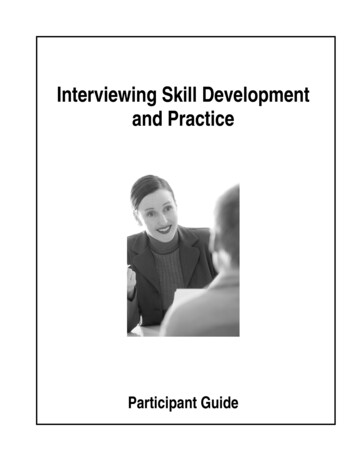
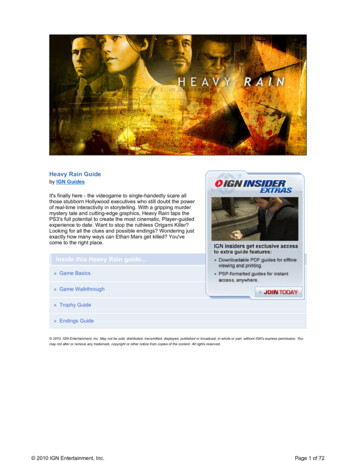
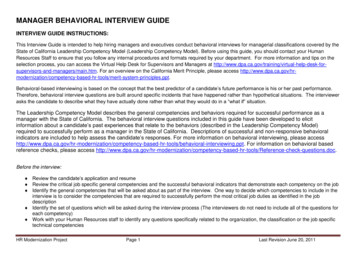

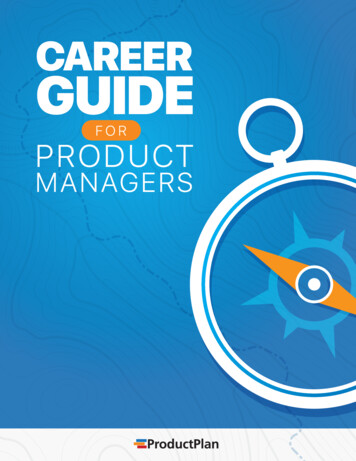
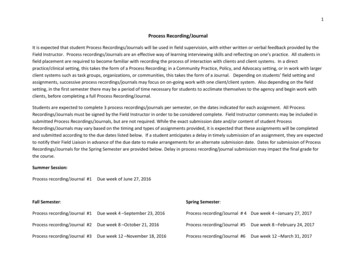

![Informatica Interview Questions and Answers [Scenario-Based]](/img/2/informatica-interview-questions-and-answers-scenario-based-1.jpg)
